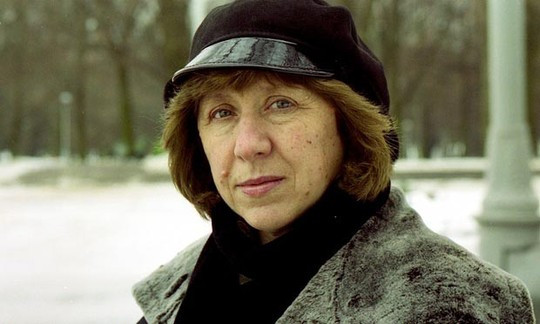Belarusian female writers won the 2015 Nobel Prize for Literature
The literary career of the writer Svetlana Alexievich fully portrays the Soviet Union in human history.
The writer Svetlana Alexievich received the 2015 Nobel Prize for Literature
As expected of the betting world, the female writer Svetlana Alexievich became the 112th Nobel laureate in history. The Swedish Academy announced: 'The 2015 Nobel Prize for Literature was awarded to Svetlana Alexievich to honor her intricate lines of writing. Her writing is a monument to gratitude for suffering and courage in our time. The extraordinary lines of literature help humankind gain a deeper understanding of an era of the world - the era of the Soviet Union ".
Svetlana Alexievich is the 14th awarded female writer. Born on May 31, 1948 in the Ukrainian town of Ivano-Frankivsk, she has a Belarusian father and a Ukrainian mother. Alexievich grew up in Belarus, where both her parents worked as teachers. She studied journalism at Minsk University from 1967 to 1972. After graduating, she worked in journalism at the Polish border and moved to Minsk to work.

Svetlana Alexievich matured from journalism.
During her career as a journalist, she interviewed thousands of witnesses who experienced the most shocking events in the Soviet bloc including World War II, the Soviet-Afghan War (1979 - 1989), the collapse of the Soviet Union (1991 ) and Chernobyl nuclear disaster (1985). Her writings are regarded as literary chronicles and by feelings of Soviet history and people.
The writer's first book was War's Unwomanly Face , taking material from the author's interviews with hundreds of women who participated in World War II. Novels are narrative lines of female characters who have experienced war. Each story of each character draws a rich and new picture of World War II. After being published in 1985, the book was reprinted by more than two million copies. In addition to describing war through a female character's perspective, she also wrote about child warfare in The Last Witnesses: the Book of Unchildlike.
Her other outstanding novel is the Zinky Boys (1992), which directly addresses the experiences of the Soviet-Afghan war. In addition, her story Voices from Chernobyl was also highly appreciated by experts when she turned to Chernobyl nuclear disaster.

Cover the book "War without a female face" .
Most of Alexievich's literary works constitute a collection called Voices of Utopia - fully portraying the human life of the Soviet Union during the war and after the Union disbanded. The latest book of this collection is Second-hand Time: The Demisse of the Red (Wo) man - completed in 2013.
Alexievich's work has been published in more than 19 countries such as the United States, Germany, England, Japan, Sweden, France, China, Bulgaria, India. In addition to writing, she also wrote plays and movies.
In 1987, War's Unwomanly Face novel was translated by Nguyen Ngoc into Vietnamese with the title War without a face of women (Da Nang Publishing House).
- October 9 announced the 2014 Nobel Prize for Literature
- The 2012 Nobel Prize for Literature is about to have an owner
- The 2017 Nobel Prize for Literature will announce the winner on October 5
- Two European writers won the Nobel Prize for Literature 2018 and 2019
- Canadian writer Alice Munro won the Nobel Prize for Literature in 2013
- Japanese-English writer Kazuo Ishiguro won the 2017 Nobel Prize for Literature
- Sweden solemnly organized the 2015 Nobel Prize Ceremony in Stockholm
- Chinese writer Mac Ngon won the Nobel Prize for Literature in 2012
- Nobel literature - unpredictable prize
- Nobel Literature announced at sensitive time
- Nobel history and things to know
- Nobel Prize: Glory, bitter and things ...
 Vietnam 5th Asian champion on fuel-efficient vehicles
Vietnam 5th Asian champion on fuel-efficient vehicles We can read all NASA studies completely free of charge
We can read all NASA studies completely free of charge Singer and songwriter Bob Dylan won the 2016 Nobel Prize for Literature
Singer and songwriter Bob Dylan won the 2016 Nobel Prize for Literature Scientific revolution in Asia
Scientific revolution in Asia